 |
| image source |
Derrick Broze
Activist Post
On Wednesday the American Civil Liberties Union filed a Freedom of Information Act request with the Federal Bureau of Investigations in an effort to find out details on a little known tool the Bureau uses to assist the National Security Agency in gathering data about Americans.
The tool, known as “port readers”, are capable of copying emails and instant messages in real time. The tool is supposed to delete the contents of the emails and leave only the “metadata” for the government. The FBI is currently working to install port readers on the networks of large telecommunications companies. In the ACLU’s request they asked for more information on the port readers. Specifically, the civil liberties group is seeking information on what metadata is being collected, how many Internet and phone service providers have installed them, how much information is collected so far, and whether or not the FBI can guarantee that information is not permanently stored by the government.
While the ACLU attempts to force the government to release pertinent information on the technology, we can gather a sense of what is being collected. The port readers were first described in August 2013 when CNET reported that a former government official stated that within the Bureau the software was known as a “harvesting program”. Another industry insider told CNET that the readers were “an interception device by definition.” AT&T, T-Mobile, Verizon, Comcast, and Sprint declined to comment on the topic.
Foreign Policy also reported on the readers , stating that the FBI collects 13 separate fields of metadata. The exact fields and types of information are publicly unknown. We do know that the data can include the route a message takes over a network, IP addresses, and port numbers.
Hanni Fakhoury of the Electronic Frontier Foundation said, “The biggest fear is that the boxes are secretly storing something, or that they’re doing more than just simply allowing traffic to sift through and pulling out the routing information.”
So how do the port readers and the data collection happen without even a secret FISA court approval?
Using what are known as pen register and trap and trace orders large amounts of data can be intercepted with very little judicial oversight. The only requirement of a law enforcement officer making such an order is that the officer certify the results will be “relevant” to an investigation. Judges have stated in the past that they have almost no ability to deny pen register and trap and trace requests, and instead act as a rubber stamp for whatever is being requested.
 The metadata collected can include IP addresses, Facebook correspondence, web site history, and more. However, with a pen register not all metadata is LEGALLY accessible. Although federal law says law enforcement can grab only “dialing, routing, addressing, or signaling information” without getting a court-approved wiretap, industry sources state that the FBI has configured its port reader to collect all metadata. This data collection would then render the programs, likely, illegal. This is yet another precarious legal gray area where data collection is concerned.
The metadata collected can include IP addresses, Facebook correspondence, web site history, and more. However, with a pen register not all metadata is LEGALLY accessible. Although federal law says law enforcement can grab only “dialing, routing, addressing, or signaling information” without getting a court-approved wiretap, industry sources state that the FBI has configured its port reader to collect all metadata. This data collection would then render the programs, likely, illegal. This is yet another precarious legal gray area where data collection is concerned.
Although not much is known about port readers themselves there is some available data on the branch of the FBI carrying out the collection of information. Located at the Marine Corps Base Quantico in Virginia is the home of the FBI’s Operational Technology Division. Inside this compound is a mysterious organization called the Data Intercept Technology Unit or DITU. DITU handles the interception of data using the port readers.
Another interesting note is how the FBI and DITU assist the NSA with spying on Americans. The NSA is officially supposed to focus on international threats and not monitor activities of Americans. Whistleblower Edward Snowden obviously destroyed that myth last summer. However, DITU and the FBI still provide access to information that the NSA may not be able to access “legally”. Once the FBI’s port readers do their job, and DITU dissects the information, anything seen to be helpful can then be passed along to the NSA for further dissection and dissemination. All this seems to be operating under the guise of barely legal or outright flaunting of the law, both public law and leaked secret proceedings.
For More Information on the ACLU’s FOIA Request:
https://www.aclu.org/national-security/fbi-port-reader-freedom-information-act-request
Recently by Derrick Broze:
- The War on Journalism: Local to Federal
- Ben Swann on Spirituality, 9/11, Censorship, GeoEngineering
- Adam Kokesh receives two years probation and time served
Derrick Broze is an investigative journalist, community activist, gardener and promoter from Houston, Texas. He is the co-founder of The Houston Free Thinkers, and co-host of Free Thinker Radio. Broze also hosts and produces a weekly podcast under the name the Conscious Resistance Live. His writing can be found on TheConsciousResistance.com, The Liberty Beat, the Anti-Media, Intellihub, Activist Post, and other independent media sources.


Be the first to comment on "ACLU Seeks Information on FBI’s Secretive “Port Readers”"